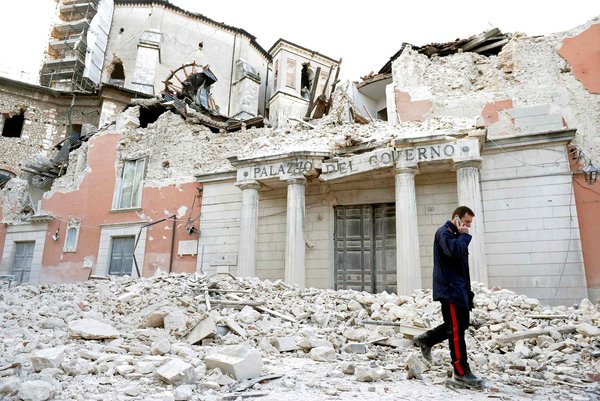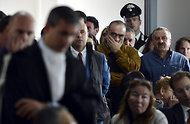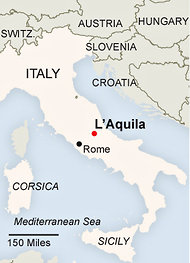
Alessandro Bianchi/Reuters
L’Aquila on April 6, 2009, when a
quake struck, killing 309 people.
ROME — Seven prominent Italian earthquake experts
were convicted of manslaughter on Monday and sentenced to six years in
prison for failing to give adequate warning to the residents of a
seismically active area in the months preceding an
earthquake that killed more than 300 people.
Filippo Monteforte/Agence France-Presse — Getty
Images
A crowd on Monday watching the trial of seven
earthquake experts in L’Aquila.
The New York Times
A period of tremors preceded the major earthquake in
L’Aquila.
Speaking in a hushed courtroom in L’Aquila, the
city whose historic center was gutted by the April 2009 earthquake, the
judge, Marco Billi, read a long list of names of those who had died or been
injured in the disaster before he handed down the sentences to six
scientists and a former government official. The defendants, who said they
would appeal the decision, will also have to pay court costs and damages of
$10.2 million.
The seven, most of them seismologists and
geologists, were members of the National Commission for the Forecast and
Prevention of Major Risks, which met shortly before the quake struck — after
weeks of frequent small tremors — but did not issue a safety warning.
The verdicts jolted the international scientific
community, which feared they might open the way to an onslaught of legal
actions against scientists who evaluate the risks of natural hazards. “This
is the death of public service on the part of professors and professionals,”
said Luciano Maiani, the current president of the risks commission,
according to the news agency Ansa. The legal and media pressure prompted by
the trial have made it impossible to carry out professional consultancies
for the state, he said, adding, “This doesn’t happen anywhere else in the
world.”
Thomas H. Jordan, a professor at the University of
Southern California, led a commission that after the disaster advised the
Italian government about better ways to communicate earthquake risks to the
public. He described the verdicts as incredible, “given that they have just
convicted scientists for basically doing their job during a time of crisis.”
“I’m afraid it’s going to teach scientists to keep
their mouths shut,” he added.
Scientists said the case raised the issue of when
a public warning is appropriate. While predicting the exact time and
location of an earthquake
is not possible, seismologists are increasingly able to forecast the
likelihood that a quake might occur in a certain area within a certain time.
But if the likelihood is very low — as it was in this case, despite the
increased seismic activity in the weeks before — a warning may do more harm
than good. Lawyers for the defendants were unanimous on Monday in their
condemnation of the sentence, which exceeded the prosecution’s request of
four years in prison, and vowed to appeal.
“I wasn’t expecting this,” said Alfredo Biondi, a
defense lawyer. He described the ruling as one of the most erroneous that he
had encountered in his long career.
“This was a trial that should not have been held
in L’Aquila” because the emotional impact of the quake is still felt so
strongly in the city, said Filippo Dinacci, who represents two of the
defendants.
More than three years after the earthquake,
L’Aquila, in the Abruzzo region east of Rome, has yet to recover fully. Its
architecturally rich center is still largely abandoned, and residents are
still mourning the dead. There are some sporadic signs of reconstruction
around the center, including the inauguration last month of an auditorium
designed by Renzo Piano, but the overall mood in the city speaks more of
discouragement and dismay.
The city and surrounding towns were felled by the
magnitude 6.3 quake in the early hours of April 6, 2009. The disaster left
thousands homeless and killed 309, many of them in their sleep.
Six days before the quake, the risks commission
met to assess the situation after the period of frequent small quakes. The
seismic activity had made the public anxious, as had a series of specific
quake predictions — none of which proved to be accurate — by a local man who
is not a scientist. After the meeting, some commission members gave
encouraging statements to the news media, which prosecutors said gave
residents an overly reassuring picture of the risks they faced. The
commission, prosecutors charged, did not uphold its mandate and consequently
did not allow residents to make informed decisions about whether to stay or
leave their homes.
In his closing arguments on Monday the prosecutor,
Fabio Picuti, cited a United States court ruling that
blamed the Army Corps of Engineers for “monumental negligence” for some
of the flooding from
Hurricane Katrina, Ansa reported. That case, Mr. Picuti said,
demonstrates that it is possible to fall short of preventing and predicting
a risk, according to Ansa.
Relatives of the victims cheered the decision.
“It’s just a tiny bit of justice so that it doesn’t happen again,” said an
unidentified woman on Sky television.
The court did not rule on whether earthquakes can
be predicted. But Fabio Alessandroni, a civil lawyer who represents the
relatives of more than a dozen victims, said the sentence showed that it is
possible to have a “culture of prevention.”
“It is possible to predict a risk and to adopt
measures that mitigate that risk,” Mr. Alessandroni said. “It’s what the
commission is supposed to do,” taking various elements, like a city’s
seismic history, into account. “And this was not done in L’Aquila.”


